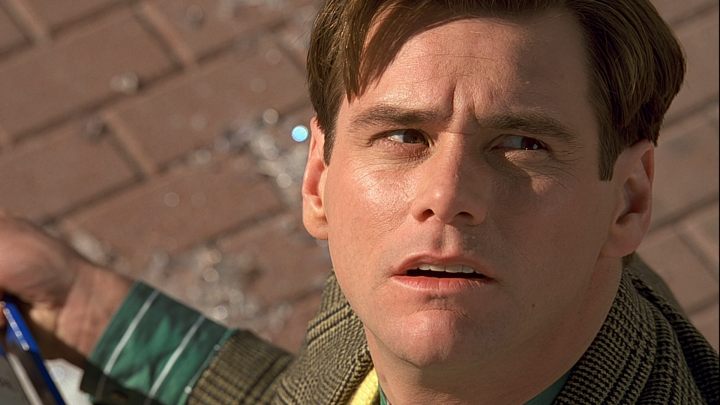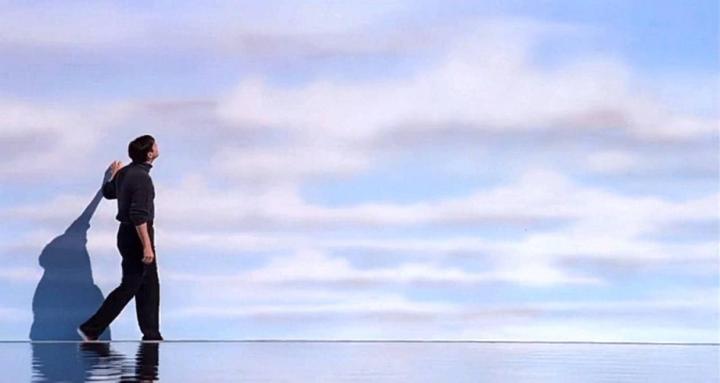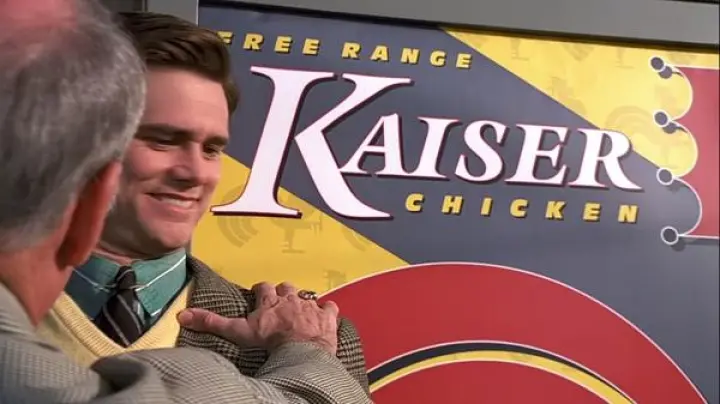‘The Truman Show’: In-Depth Analysis
And that stands to reason. ‘The Truman Show’ is, by all accounts, a masterpiece. Built on a brilliant premise, with great direction, flawless editing and cinematography, and an amazing performance by Jim Carrey, ‘The Truman Show’ doesn’t really have many imperfections. It checks all boxes.
(If you haven’t, you can watch ‘The Truman Show’ here or buy the Blu-Ray here.)
In an ideal world, a good film must do three things with its story: it must be accessible, understandable and interesting to the generic viewer, it must have a strong and developed character to stand in the middle of it, and it must be layered. Most good films fit one of these requirements, some fit two, but it’s really rare that a movie’s storytelling is so good that it fits all three. ‘The Truman Show’ does.
And it’s that last point, the layering, that has people rewatching and talking about the movie to this day. ‘The Truman Show’ is filled with thought-provoking ideas, meanings, metaphors, Easter eggs, themes, and motifs. What follows is a guide to a better understanding of those things within ‘The Truman Show’. Keep in mind, this will be fairly compact and the points will overlap; there is so much to talk about this film and one could easily write a book about it; it’s impossible to fit everything in one article.
If you haven’t seen the film yet, you can stream/buy it here.
And obviously: massive spoilers.

God and Religion
Christianity and God are explored a lot throughout ‘The Truman Show’. Christof, the creator of the show, is, ultimately, the God of the world Truman lives in. He has created the world and manipulated it to serve his desires. He is also Truman’s personal God, standing as an all-mighty figure that (literally) watches from above. By the end of the film, Christof even talks from the sky to Truman, furthering the idea that he is both the God of the world and Truman’s personal deity.
Christof’s act of trying to drown the boat goes back hundreds of years and has been explored through many olden myths and legends. Christof is the all powerful being, the one that can literally control the weather, trying to challenge the ordinary man and prevent them from achieving their goals.

The name is also significant here: Christof, an iteration of Christ, or even better, a play on words meaning Christ-Off. It can be argued that Christof is in fact a fake God (Christ-Off), doing things in the manner of a deity, but ultimately doing things no deity should ever do. He is everything a God can do to a world, everything a God will do, but nothing they should do.
There isn’t much support to this thesis, however. It’s evident throughout the film that, to some extent, Christof genuinely cares about Truman. The creator may be somewhat evil and wrong, but he is no hypocrite: he truly believes that what he is doing ‘gives hope and joy and inspiration to millions’ and that he is being kind to Truman by actually doing him a huge favor. Christof is, in many ways, not only a God to Truman, but also a father: the way he speaks to him in the final scene, the way he gently touches the screen when Truman is sleeping, and the fact that he has literally gotten rid of Truman’s ‘actual’ father. Christof says ‘I was watching when you were born. I was watching when you took your first step. I watched you on your first day of school.’ and in some strange, twisted way, Christof is the father figure Truman always wanted and never knew he had.
All this is ultimately a take on society and the way we perceive religion. The film is actually highly critical of Christianity. It states that IF there was a real God, then our reality is ultimately fake. Nothing is random, nothing is our choice, everything is controlled by something that we’re not even sure exists. Truman’s reality is completely controlled, as stated in the next point, and the film goes on about the fact that our reality may be the same. Every time we step outside, we are at God’s hands. Every time it rains, it’s not a coincidence. We are constantly being watched, listened, and, most importantly, controlled. ‘The Truman Show’ is expanding on the idea that God may be a puppeteer and we may simply be the puppets; we blindly trust the puppeteer, not even knowing he is there, and all reality is fake.
True Reality vs. Fake Reality
This nicely blends into another theme deeply explored within ‘The Truman Show’, which is the actual reality of things vs. the fake life that we all lead. The film smartly underlines and explores the idea that all of us desperately need something real. The film states that, most simply put, we all lead fake lives, all controlled and manipulated by the media, the people around us, and possibly a higher power. Nothing and nobody we see is the complete and utter truth.
Which explains why people watch ‘The Truman Show’. It also explains why the world Truman is living in is so similar to the actual outside world. Many ask why there even was a travel agency is Truman’s world; since he’s been there forever and since his entire idea of the universe is 100% manipulated by Christof, why even mention the existence of planes? Why not tell Truman that nothing even exists beyond Seaheaven? Wouldn’t that guarantee him staying within the show forever?
But that wouldn’t work, would it? Because the people, the viewers, need something real. That is why the world Truman is living in is ultimately the same world all of us are living in. The audience wants to see exactly that, just more authentic and with someone genuine living in it. That is also why ‘The Truman Show’ was such a success: because Truman is the only genuinely real thing in the entire world. His environment is controlled, his life is manipulated, but Truman is 100% himself throughout all this. That’s why people want to watch him; they need an escape from their own lie and into someone else’s life: someone who is real. Even his name is a play on words: Truman = true man.

Truman begins his quest as a lamp falls from outside his house. The lamp is named Sirius, representing the brightest star, the one travelers use for guidance, and symbolizes the beginning of Truman’s adventure within his own world. The film ends with Truman puncturing the walls of the world or, to put it in another way, quite literally puncturing through his own personal fourth wall. I find this entire quest, starting from the falling light and ending with the puncture of the wall, to be one of the best uses of irony in the history of cinema. Truman’s world is the only real thing to everyone on the entire planet, but Truman himself, the only real person, the only person to actually live in this world, eventually finds it to be fake. So ultimately, reality doesn’t exist. Everything is fake.

The Allegory of the Cave
After Truman finds the boundaries of his reality, he has a talk with Christof. What the creator tells the man is something that wonderfully summarizes another idea explored throughout ‘The Truman Show’: the allegory of the cave.
The allegory of the cave is an extremely well-thought-out experiment and smarter people have done a way better job explaining it than the author of this article can. This video is a good in-depth explanation of what exactly it is. But here is the shorter version: the allegory theories a group of people who are stuck in a cave their entire life, seeing only shadows of real life projected on the wall in front of them. If those people were to get out of the cave and see the real world, see the people behind the shadows, it would be too overwhelming and they would want to go back to what they are used to.

A great experiment trying to conclude that ‘ignorance is bliss’. ‘The Truman Show’ is ultimately the exact same experiment, just on a much larger scale. Seahaeven is the cave and the people in it are the shadows. There is much beyond that, there is a ‘real’ world, but Truman doesn’t know it.
When the man finally does find out, he speaks to Christof and the creator tells him that ‘There is no more truth out there than there is for the world I created for you. The same lies, the same deceit. But in my world, you have nothing to fear.’
Christof gives Truman a choice: stay in the world and stay ignorant or choose to face reality. The former is much simpler choice; this way, Truman would never have to face the reality he never knew existed. The latter, however, presents Truman with the opportunity to finally, for the first time in his life, see the truth; a truth he never even knew was out there.
Truman, of course, chooses the latter. He chooses to leave the cave. Truman, like everyone else in the world, wants to live and experience what’s real. Ironically, to everyone else, him and the world he lives in are the only real things. To him however, everyone else and the world they live in are the only ultimate reality. No one really prefers the cave, even though it’s the simpler option. Everyone wants reality, but ironically, one person’s reality is another person’s cave.

The Entertainment Industry
Another idea vastly explored throughout ‘The Truman Show’ is toxic entertainment. Stepping away from the fact that this film literally foreshadowed the upcoming epidemic of reality TV (Big Brother is just a fake version of ‘The Truman Show’) and stepping away from Truman himself for a bit, there is much to understand about toxic entertainment from the way the show functions and the fanbase around it.
The final line of the movie is ‘Let’s see what else is on’ by a generic viewer of ‘The Truman Show’. This digs into the idea that the show is just one of many; ultimately, it made no difference. It’s toxic, it’s just another method of escapism, it’s jealously, anger, lies, and truth all in one. Even after what was presumably the biggest television event ever (Truman’s escape), the world changes in no way. People change in no way. Entertainment continues and leaves no dent in society whatsoever.
The way the show itself functions is another brilliant critique at the entertainment industry. The best example of this would be the actress, Hannah Gill, playing the character of Meryl Burbank, Truman’s wife. She has voluntarily put herself in a position very similar to that of Truman. Hannah Gill is in the spotlight of ‘The Truman Show’ every single day and living a fake life every single day, all for the sake of money and fame. This is a critique of Hollywood: different creators giving their lives away for fame and money. To take this to an extremity, Hannah Gill can be considered a literal prostitute as she has sex with Truman on camera. There is even a clause in her contract stating that any time she engages in intimate activities with Truman, she gets a huge bonus. Hannah Gill has given up everything: her body, her mind, her personality, her whole life just to achieve her ‘dreams’. She is not different than Truman, expect that she is living the fake life voluntarily and getting something in return. And morally speaking, that is even worse.

Media Control
Finally, ‘The Truman Show’ is also a commentary on the control that media puts on individuals and the society. This wonderfully foreshadows the world’s current political state, but that’s a completely different subject.
To begin with, the individual. We’ve concluded that Truman’s life and being is monitored and controlled, but what about his personality? Christof himself says that they needed to figure out a way to keep Truman on the island. They decided to alter his fears and dedications by killing off his father from the show by drowning in the ocean. This gives Truman a lifetime fear of water and an inability to leave Seaheaven. Even Truman’s beliefs and fears are controlled by a deity; this is a beautiful allegory on our world. Many of our ideals, fears, dedications, even our entire drive can sometimes be controlled and altered by the media. The things we see and experience can control our lives and change them forever. It’s surely not a drastic as with Truman, but the idea is the same: something seemingly random happens to us and we change because of it. That may, however, not be random, it may be controlled by the media, just as it wasn’t with Truman, and the whole point of it may be to change our views.
Just remember the Facebook scandal from less than a year ago and you will get this point.
(Some other great foreshadowing is the fact that Truman has no privacy whatsoever: his entire life is monitored and recorded without his knowing.)

But going into the society, media control is once again presented as a big problem throughout ‘The Truman Show’, starting with advertisement. As mentioned explicitly throughout the film, ‘The Truman Show’ actually runs 24/7 with no commercial break. They mention that the only way to make profit is through product placement. Some of the best moments in the movies are actually the ‘unnoticeable’ ads within Truman’s life: the cocoa powder, the shredder, the lawn mower. This is once again a clever commentary on our society: profit made by product placement leading to the constant control of what we buy through the media.
Furthermore, one of the most brilliant (and overlooked) scenes in ‘The Truman Show’ is actually the first time we observe the control center. In Seaheaven, this is the moment when Truman meets his ‘father’. In this moment we see Christof directing the show: picking the cameras and the angles, choosing when to cut, cuing the music, etc. The scene in itself is actually amazing and, once again, foreshadows the future of reality TV. This moment illustrates how through smart camera placement, editing, music, etc., show-runners can make any real-life moment appear not the way it actually is, but the way they want it to appear; there is no raw truth in entertainment. The way Truman’s meeting with his ‘father’ was shown on TV was actually much more melodramatic than the actual encounter. Christof manipulates the audience’ feelings, gaining the emotional reaction he needs from them and getting higher ratings. Again, something all reality TV does nowadays.

Conclusion
One of the best trivia facts about ‘The Truman Show’ is that the creators of the movie wanted to install a hidden camera in every theater the film was showing. During one of the moments in the film where we watch the world watching the show, the theater would stop the film and suddenly start transmitting the hidden camera; this way, the viewers would see themselves within the movie. Shortly after, they would cut the fee and continue playing the actual film.
‘The Truman Show’ isn’t a commentary on some fake society within the story. The film is about us. About how God controls our lives. How we don’t have any free will. How we all seek a reality because our lives are, ultimately, fake. We all watch meaningless entertainment to feel something real, but it ultimately leaves absolutely no impact on us. All of us want to leave the cave, we want to find some reality, but we are not even aware that we are in the cave. We are constantly being watched, listened, controlled, and manipulated. We sell ourselves to an industry that makes no difference. We make no difference. Free will and reality are illusions.
‘The Truman Show’ is actually much more pessimistic and critical than people realize. The film has so much to it, so much to take from, so much to learn. We should cherish, save, study, and love ‘The Truman Show’. It’s worth it.
Watch ‘The Truman Show’ here or buy the Blu-Ray here. Or grab a poster here.

___________________________________________________________________________________________________
Have you seen ‘The Truman Show’? What did you think of it? Share your thoughts in the comments section below! Don’t forget to LIKE and SHARE this article if you enjoyed it and also to SUBSCRIBE to Our Movie Life!
As always, thank you so much for reading,
Pouty Boy
